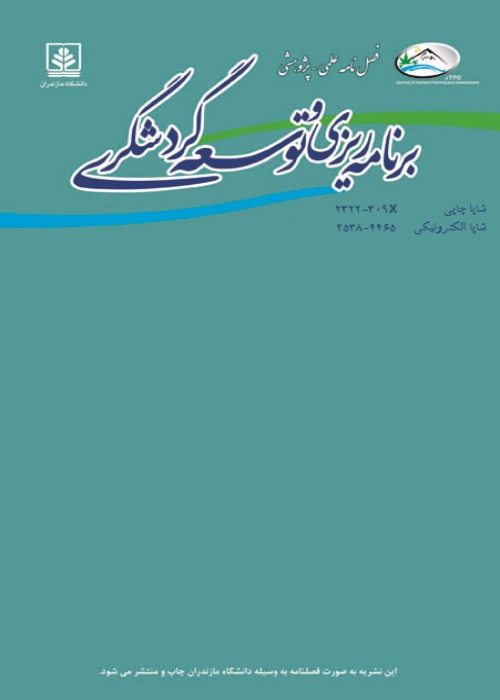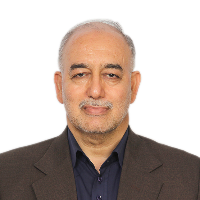Institutional Trust and Investment in Tourist Units (Case Study: Golestan Province)
Author(s):
Abstract:
The first and the most important factor in investment is attention to security and trust. Investors trust to social entities and organizations, especially state organizations called institutional trust, paly significant role to intend investment in tourist units. As one of tourist destinations, Golestan province has diverse tourism attractions which are faced with various problems in investment for different reasons such lack of security and trust senses. The main goal of the research is to identify the relationship between institutional trust level and investment in tourist units of Golestan province. Survey method and researcher made questionnaire have been used in the research. Accordingly, 139 questionnaires were distributed among investors of tourist units and the results were analyzed using SPSS application. The results indicated that there is not a significant relationship between institutional trust and investment. Also, comparing under studied groups and entities indicated that investors have more trust to universities, education centers, parliament and city council. Additionally, the findings indicated that there is not a significant relationship between institutional trust and type of tourist units. At the end need for better planning proposals such as strengthening security in the area of investment, encouraging private sector investment in the construction and development of tourist facilities, government support and capacity building for investment in the tourism sector are provided.
Investment plays significant and key role in economic development and growth. The experience of developed countries has indicated that investment had been main factor of their economic development and growth. Institutional trust is one of the key elements that have undeniable effect on tourism sector. Tourism provides new patterns that can change and organize personality characteristics and life space of people. Also the pattern represents structure, values and beliefs of the people who inhabit in that territory. According conducted studies, the number of tourists will reach one billion people. For this reason, tourism is one of the world's leading industries and a major economic development tool. Additionally, when government officials pay attention to tourism and tourism problems are vital for them, they show more interest to supply the needs of different local communities and provide better service to public. Based on above explanation, the goal of the research is to identify the relationship between institutional trust and investment in tourism sectors of Golestan province from perspective of owners of tourism units.
Discussion and
Introduction
At present, tourism industry needs modern and updated facilities and equipment. However, Iran has a treasure of ancient monuments, natural resources, cultural heritage and handicrafts. This capacity along with various climates provide an appropriate condition for all types of tourist in Iran, such as sport, dissert, winter and event tourists and religious and cultural tourisms. Another type of tourism is industrial tourism which would be as top industry after oil until 2020. The tourism is required more attention and capital. Therefore, the programs should be moved to a direction that tourism industry in Iran can gain its niche among other countries in investment point of view.Investment plays significant and key role in economic development and growth. The experience of developed countries has indicated that investment had been main factor of their economic development and growth. Institutional trust is one of the key elements that have undeniable effect on tourism sector. Tourism provides new patterns that can change and organize personality characteristics and life space of people. Also the pattern represents structure, values and beliefs of the people who inhabit in that territory. According conducted studies, the number of tourists will reach one billion people. For this reason, tourism is one of the world's leading industries and a major economic development tool. Additionally, when government officials pay attention to tourism and tourism problems are vital for them, they show more interest to supply the needs of different local communities and provide better service to public. Based on above explanation, the goal of the research is to identify the relationship between institutional trust and investment in tourism sectors of Golestan province from perspective of owners of tourism units.
Materials And Methods
Survey method has been used in the research and researcher made questionnaire has been applied to collect data. Statistical population is all investors of tourism units in Golestan province (129 units) such as resorts, hotel, apartment hotel, traditional restaurant. Since number of statistical population is limit, then sampling has been disregarded and all 139 tourism units have been studied. Two types of data have been used to measure main concepts of the research. Survey research and research made questionnaire have been applied to measure institutional trust in form of field of study, with emphasis on conceptual definition of institutional trust from perspective of Antony Gidens (1999). Its validity has been approved using Cronbachs alpha coefficient (0.947) and its reliability has been proved using specialists opinions. All phases of classification, processing and analyzing have been done using SPSS application. Second part of data is related to measure investment level in tourism units which has been assessed and analyzed using secondary analysis method and reference to existing documents in tourism, handicraft and cultural heritage organization of Golestan province. In order to measure the independent variable, institutional trust by the respondents trust the institutions and organizations related to tourism activities were evaluated. Organizations and institutions to include banks, hospitals and health centers, Parliament, Sound and Vision, the judiciary, the police, the municipality, the City Council, local press, universities and educational centers, market, environmental organizations, Health organization, roads and Urban Development, regional water, power companies, gas companies, oil companies, cooperation organizations and municipalities, and village administrations.Discussion and
Results
The tourism industry in the past decade a significant share of economic success and social mobility led to their cities, and for this reason, many cities in the world have taken steps to promote and improve the industry. Institutional trust in the shift of control of the organization from the individual level to the level of collective decisions rooted. This form of trust in what appears to be a social factor through certain institutional arrangements, a preliminary commitment founded on a set of common principles and normative regulations relating to the conduct within the organization, The other factor is. Considering that currently the country in terms of security and moderate tourists passable and the security level is high compared to countries in the region, in other hand nowadays, security is considered as one of the most important and most fundamental principles to formulate development strategy of tourism. Hence, investment in this sector can contribute to lead effectively its programs. From one hand, trust, especially institutional trust, is regarded as an important element in this sector. The goal of the research is to study institutional trust and investment in tourism units in Golestan province. In this regard, three hypotheses were developed. In the first hypothesis, institutional trust and investment were analyzed in tourism units. The findings indicated that justice gained the highest trust among guild of tourism units and ministry of health obtained the lowest trust limit that only its reason is to monitor health ministry on this unit. In the second hypothesis, investment in tourism units was analyzed in terms of type of units. In this section, at first investment of statistical indexes were studied and statistics indicated that average investment was 547460000 Rials. Then, it was observed that there is not a significant relationship between institutional trust and investment in tourism units, but direction of relationship is negative and intensity of it is very weak. Finally, the third hypothesis studied the relationship between institutional trust and investment in tourism units and the effect of type of tourism units and comparing groups and under studied institutions indicated investors have more trust to universities, educational centers, parliament and city council, while investors have the least trust to justice, road and city planning, hospitals and health centers and regional water. Then, it became clear that hotels have the highest level of investment average as the biggest type of tourism units and apartment hotels and resorts were placed in next ranks. Then, it was observed that there is not a significant difference between institutional trust and type of tourism units. With controlling type of tourism unit, the changes of relationship between institutional trust and investment level were studied. The findings indicated that type of tourism units has influential effect on investment level. Finally it can be said that tourism is one of the most important sectors that can be achieved economic progress by investing at national and regional levels.Conclusion
The finding of the research indicated that tourism investment should be sustained and investment trust is regarded as the most important element in the sector. The results are compatible with findings of Bamsenji and Heydari (2013), Souvizeri and Mohammadi (2012), Nenko (2015), Lee (1997) and Mordov (1999). From another hand, it must be tried to create security for attracting investment and tourists (Stainer, 2006, Hall, 2008, Nicolas et al, 2014, Hezar Jaribi and Najafi, 2011, Shahivand et al, 2012. Keywords:
Language:
Persian
Published:
Journal of Tourism Planning and Development, Volume:5 Issue: 16, 2016
Pages:
47 to 70
magiran.com/p1548867
دانلود و مطالعه متن این مقاله با یکی از روشهای زیر امکان پذیر است:
اشتراک شخصی
با عضویت و پرداخت آنلاین حق اشتراک یکساله به مبلغ 1,390,000ريال میتوانید 70 عنوان مطلب دانلود کنید!
اشتراک سازمانی
به کتابخانه دانشگاه یا محل کار خود پیشنهاد کنید تا اشتراک سازمانی این پایگاه را برای دسترسی نامحدود همه کاربران به متن مطالب تهیه نمایند!
توجه!
- حق عضویت دریافتی صرف حمایت از نشریات عضو و نگهداری، تکمیل و توسعه مگیران میشود.
- پرداخت حق اشتراک و دانلود مقالات اجازه بازنشر آن در سایر رسانههای چاپی و دیجیتال را به کاربر نمیدهد.
In order to view content subscription is required
Personal subscription
Subscribe magiran.com for 70 € euros via PayPal and download 70 articles during a year.
Organization subscription
Please contact us to subscribe your university or library for unlimited access!



